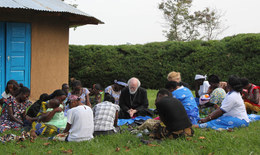Archbishop's video message for World AIDS Day

Wednesday 30th November 2011
The Archbishop of Canterbury has recorded a video message for World AIDS Day in which he talks about the part sexual violence plays in the spread of HIV, calling it ‘one of the most shameful facts of our day’.Dr Williams recorded the video message during a recent visit to the eastern part of the Democratic Republic of Congo which he describes as having been at ‘the epicentre of a great deal of appalling violence in recent years.’ He talks specifically about the use of sexual violence as a tool of war - something which is used to ‘humiliate and subdue others’ and the extent to which the people in the DRC have suffered from this particular type of brutality which has become endemic in many communities.
In his message Dr Williams highlights the crucial role that the Church has played in supporting survivors of such abuse, and especially in combating the stigma that they so often face in their own communities as a result of this violence:
“Trauma is something which cannot be overcome overnight but when people feel they’ve been abandoned by families, by communities, because of the shame and stigma of HIV/AIDS, the church in this part of Congo has been there for them. For these people, who have been abused systematically, been raped, violated, abducted often at the youngest of ages – for these people, the church has been the family that mattered.”
Churches, and other faith communities, need to show leadership to end a culture of silence and fulfil their potential to help reverse the prevalence and devastating impact of sexual violence. In praising the vital work of the Anglican Church of Congo, the Archbishop expresses his hope that the campaign against sexual violence and associated stigma will continue both in the DRC as well as in other parts of the world:
“As we seek to confront the terrible scandal of sexual violence as one of the causes of HIV and AIDS, let’s hope and pray that communities like the churches here will continue to fight as hard as they can against the stigmatising and marginalising that so reduce human dignity.”
In marking World AIDS Day 2011, Dr Williams also raises his concern about current reports of a decline in available funding resources which will threaten the recent and remarkable progress achieved by the global AIDS response. He urges the international community to uphold its funding commitments to see this progress not only sustained but accelerated to halt and reverse the spread of AIDS.
The Primates of the Anglican Communion have taken a collective stand against gender-based violence. At their meeting in Dublin in January 2011, they committed themselves to action and wrote to their churches setting out ways in which the churches can respond.
We Will Speak Out is a coalition of Christian churches and agencies committed to speaking out against sexual violence, challenging attitudes that perpetuate it, and caring for its victims and survivors.
A transcript of the Archbishop's video message follows:
This is north-eastern Congo. It’s an area which has been at the epicentre of a great deal of appalling violence in recent years. Peace is slowly returning but not always returning very quickly to the minds of those who have suffered most.
The conflict in Congo has made it hideously clear that sexual violence is one of the great tools of war in our age; one of the great means by which people humiliate and subdue others. The women in Congo, especially in this part of Congo, have suffered dreadfully because of this. And the connection between sexual violence of this kind and the spread of HIV/AIDS is one of the most shameful facts of our day.
Trauma is something which cannot be overcome overnight but when people feel they’ve been abandoned by families, by communities, because of the shame and stigma of HIV/AIDS, the church in this part of Congo has been there for them.
For these people, who have been abused systematically, been raped, violated, abducted often at the youngest of ages – for these people, the church has been the family that mattered. The church has been the community that has given them back the dignity that they need. The church has given them the hope that they need.
As we seek to confront the terrible scandal of sexual violence as one of the causes of HIV/AIDS, let’s hope and pray that communities like the churches here will continue to fight as hard as they can against the stigmatising and marginalising that so reduce human dignity.
I am grateful to have had the opportunity of listening to the experience of women here – grateful, though it has been hard to hear. I hope the world will be able to hear what is being said here and to see what is being done here.
